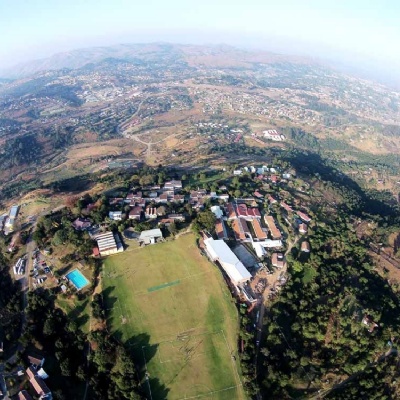Waterford Kamhlaba UWC of Southern Africa
Mbabane, Eswatini
620 Students
Aged 11 to 20 years
1963

Waterford Kamhlaba UWC of Southern Africa was founded in 1963 as a response to the separate and unequal educational systems in South Africa. The property on which the School is situated was originally a farm called "Waterford Park Estate". When His Majesty King Sobhuza II, the former Ngwenyama of Eswatini (formerly Swaziland), visited the school in 1967, he gave it the name "Kamhlaba", by which he meant both "of the world", a world in miniature, and also that we are "of the earth" and therefore without distinctions such as race or religion. Differently to all the other UWC schools and colleges, the academic year at Waterford Kamhlaba runs from January to November.
Three Unique Features
- Strong Relationships with Local Change-Makers - The School, through community service, has strong relations with local organizations such as the refugee camp and neighborhood care points (children welfare centres).
- Waterford Kamhlaba is the only UWC school on the South hemisphere calendar - While other UWC schools' academic years usually run between September and May, Waterford's follows the South hemisphere norm starting in January.
- First Multiracial school in SA - Waterford Kamhlaba was the first multiracial school in Southern Africa; founded as a direct response to South Africa’s system of apartheid, which had racial segregation as a policy did not allow multiracial school. Its history of embracing and celebrating diversity from across Africa and beyond is something deeply ingrained into Waterford Kamhlaba’s nature and continues to be at the core of its values today.
In the Classroom
Waterford Kamhlaba offers three educational programmes: the Waterford curriculum in the junior school, consisting of Forms 1 to 3 (11-14 year-olds); the University of Cambridge International General Certificate of Secondary Education (IGCSE) program in the middle school, consisting of Forms 4 and 5 (14-16 year-olds); and the International Baccalaureate Diploma Program (IBDP) curriculum in the senior school (16-20 year-olds).
Students in Form 5 do not gain automatic admission to the IBDP but need to go through an application process.
For the IBDP curriculum, the school offers alongside standard courses SiSwati, French, Spanish, Anthropology, Psychology, Business Management, Music, Theatre.
Outside the Classroom
Waterford Kamhlaba offers a wide variety of sporting activities, including athletics, badminton, basketball, cricket, hockey, netball, rugby, soccer, softball, squash, swimming, volleyball and tennis. Other recreational activities include camping, climbing, horse riding, kayaking and road as well as cross-country running. A variety of art clubs (including drama and music) and societies are run by both staff and students. Since 1979, a commitment to community service has also been formally recognized as an essential part of the school’s policy, organisation and life. A regular commitment of two hours a week to a service project is required of IBDP and Form 5 students, and projects usually vary from involvement at the local hospital, work for the disabled, at local schools and preschools, and environmental awareness activities such as a recycling program.
Campus and Facilities
Ekukhuleni (the place of growing) residence accommodates up to 80 Form 1, 2 and 3 students. Esiveni (the place of the people of the nation) accommodates up to 110 Form 4 and 5 students. Emhlabeni (the place of the people of the world) and Elangeni (the place of the rising sun) accommodate, respectively, up to 130 and 68 IBDP students, in either single rooms or shared rooms; they consist of separate wings for males and females, a common room, computer centre, library, TV room and kitchen. Each day there is one male and one female residence tutor on duty in each residence. The campus also has exceptional sports, arts and learning facilities.
Geographic Setting
Waterford Kamhlaba is perched on a mountain-top in Sidwashini, about a 10-15 minute drive from Eswatini’s capital of Mbabane. The campus is home to an incredible blend of indigenous flora and fauna. Hiking trails up the school’s peak provide an incredible view of Eswatini’s picturesque landscape.
Admissions
Students apply through their UWC national committee or through the UWC Global Selection Programme. Direct applications are also possible. For more information about Waterford Kamhlaba UWC of Southern Africa, visit the website.
Contact Details
Waterford Kamhlaba UWCSA
P.O. Box 52
Mbabane H100, Eswatini

